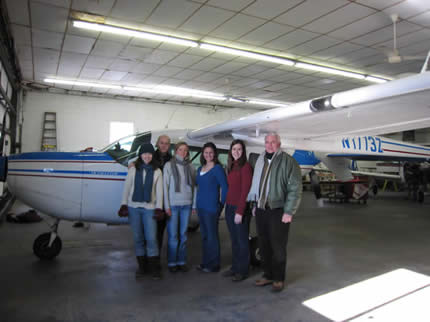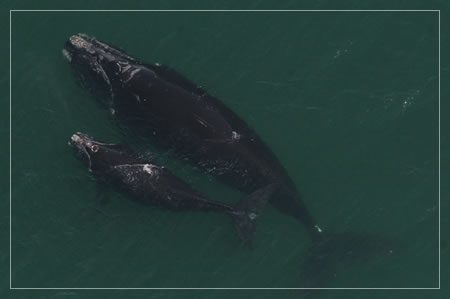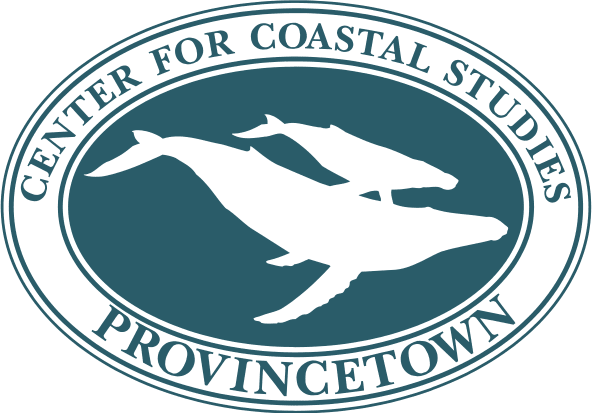January 2009
30 January. The Habitat Studies group sighted our first two right whales of the 2009 season! During a transit between stations about mid-day, atop our observation deck, a team member saw the telltale V-shaped blow of a surfacing whale. With a range and bearing, we steamed to where the whale was last seen to catch its next surface interval, intent on making some behavioral notes, individual photo identifications and an opportunistic sampling of the water column to quantify zooplankton density proximate to the whale(s). The whales’ general behavior was noted: short surface times, 15 – 20 minute dive durations, often displaying their flukes as they dove. We spent approximately 45 minutes conducting focal sampling of these two whales, and then returned to our primary mission: routine sampling of 9 regular stations in efforts to assess available prey resources and to forecast when feeding whales likely will return in numbers to feed in the waters of Cape Cod Bay. Let the season begin!
26 January. Identifying another small window of good weather, the aerial team took off from Chatham airport on Monday morning. Calm seas and unlimited visibility made for near-perfect sighting conditions, and as we flew our first trackline off the backside of Cape Cod, we saw two humpback whales, easily identifiable from the air by their long, white pectoral flippers. Although most of the humpbacks from the North Atlantic spend their winters in the lower latitude mating grounds of the Caribbean, we will occasionally find juveniles spending their winter in the feeding ground.
After no sightings on our northern tracklines, we finally came across our first right whale of the season near Jeremy Point in Wellfleet. This whale appeared to be traveling north, and spent very little time on the surface, making it quite a challenge to photograph! Back in the marine lab, we are working hard to match this whale to a known individual based on the distinct callosity pattern on its head. Once we identify this individual, we can start to gather demographic information about the whales seen in Cape Cod Bay.
23 January. The PCCS Habitat team set out for its second cruise of the season today with low temperatures, clear conditions and moderate westerly winds. We were optimistic that we might encounter our first whales of the winter-spring 2009 season as acoustic buoys in Cape Cod Bay (listenforwhales.org) had recently detected right whales. However, there were no confirmed sightings of whales today by our research vessel or by the Aerial team. One harbor seal was sighted towards the end of our cruise.
We met our sampling objectives for all 8 stations regularly monitored, plus one additional station at the north end of the bay. CTD (Conductivity, Temperature, Depth recorder) casts were also made providing valuable information regarding oceanographic conditions. With additional analysis, we shall comfirm if the apparent decline in zooplankton densities at our stations compared with our last cruise might suggest one reason for the continuing absence of whales to-date. In most seasons, the arrival of whales to CCB coincides with the formation of dense aggregations of zooplankton, particularly calanoid copepods. We did note one station near the mideastern portion of the bay where our plankton tows were fairly dense with a rich prey resource.
23 January. Our plane, a Cessna Skymaster 336, arrived from Oregon a few weeks ago and today the weather finally allowed for our first aerial survey of the season. The acoustic detection buoys in Cape Cod Bay have been detecting right whale calls for the past few weeks, and we were eager to see for ourselves whether these critically endangered animals had started to occupy their winter feeding ground. We took off from Chatham airport, starting in the southern part of the bay and working our way northward, our eyes trained to spot any surface disturbance that might indicate the presence of a whale. The slightly overcast skies and calm water made for ideal sighting conditions, but save for a few seals near Wellfleet, no other marine mammals were observed. We’re watching the weather in hopes that we’ll start to see right whales on our next flight!

13 January. The first research cruise of the 2009 season departed Provincetown Harbor at 0840 today. Under mostly cloudy skies, light to moderate winds, and seas at 1 to 2 feet, the R/V Shearwater steamed to its regular monitoring stations while researchers scanned the waters for whales and other marine species. We observed several species of birds (eiders, white-winged scoters, loons, cormorants) and general wintertime conditions on the bay, but no right whales were seen. To date, there have been no confirmed sightings of northern right whales in Cape Cod Bay, a known winter foraging ground for this endangered species.

Our Work
Humpback Whale Research
Right Whale Research
Marine Animal Entanglement Response
Marine Geology Department
Water Quality Monitoring Program
Marine Fisheries Research
Seal Research
Shark Research
Marine Education
Interdisciplinary
Marine Debris and Plastics Program
Marine Policy Initiative
Cape Cod Climate Change Collaborative
Publications

